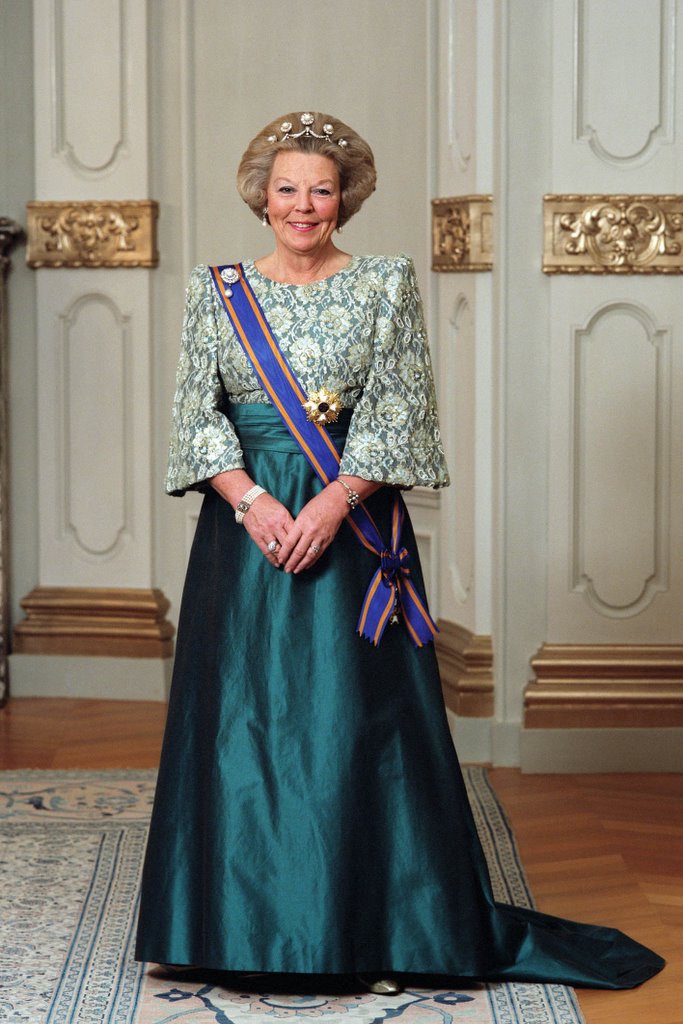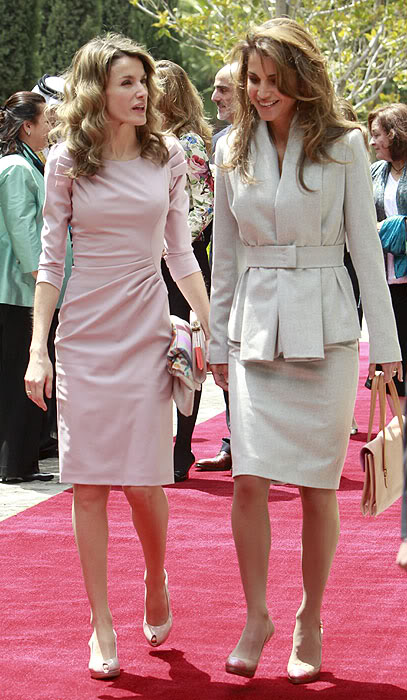A Princess is modest (Tznius) in her dress. It does not have to be expensive or fancy, just comfortable, not tight or stretchy, and can cover up.Even as a teenager Princess (Queen) Elizabeth dressed properly.Cover your Elbows, and Collarbone. Your Skirt should be mid-calf or lower. And Please no pants. Men wear the Pants unless you are in Scotland. Kilts anyone.Women if you are Married Please cover your hair with a Snood of stead of a Wig. From Chabad.org Uncovering the Mystery of ModestyFrom Breslov.co.il The MetamorphosisWhy is it important for a woman to dress modestly?By Chaya Sarah Silberberg https://www.chabad.org/library/article_cdo/aid/626355/jewish/Why-is-it-important-to-dress-modestly.htm Tzniut – modesty – has always been the hallmark of the Jewish woman, Tzniut in its greater sense is dignity and self-respect, an understanding of one’s intrinsic self-worth. When a woman acts and dresses in a tzniut way, she effectively tells the world that she expects to be judged as a human being with skills and capabilities, intellect and emotions, and not as a “piece of meat” that is being displayed to attract the attention of a buyer. Read the “suggested dress for women” section in any manual on how to apply for a serious job, and you will be amazed at how closely it correlates to the general laws of tzniut. Because the woman applying for a job is expected to be hired on the basis of her abilities, not her body… It would seem to me that any true feminist would actively encourage all girls and women to dress tzniut! … |
|
This is what you are supporting when you shop for Not Modest fashion.Do you really want to look like this?A Prostitute?
http://www.schnews.org.uk/satire/index-sweatshop.html Sweatshops still make your clothesBy Jake Blumgart https://www.salon.com/2013/03/21/sweatshops_still_make_your_clothes/ It’s been 16 years since Cha rles Kernaghan made Kathie Lee Gifford cry on national television, revealing that her Wal-Mart-sold clothing line was produced by Honduran children working 20-hour shifts. It was an essential moment in bringing labor conditions in the developing world — specifically in the garment industry — to the attention of the American public. But not that much has changed. Looking back on the movement and its achievements in an interview, Kernaghan sounds defeated, even as he reels off the list of horrific factories exposed by his Institute for Global Labour and Human Rights. Kernaghan’s gloomy mood stems from the report he is writing now on a recent trip to Northern Bengal, where the Institute secretly met with workers from the Rosita and Megatex factories to follow up on a previous exposé. The two factories produce expensive sweaters for an array of European apparel companies, companies which assure their customers that the workers are guaranteed the core rights established by the International Labor Organization (ILO), including freedom of association and the elimination of child labor. Well, that turns out not to exactly be the case. And it turns out that most Americans still likely know very little about the conditions under which the clothes they wear were produced. “It was ridiculous. In fact it was one of the worst factories we’ve seen,” says Kernaghan. “There was child labor, people were being beaten, cheated of their wages — and wages were very, very low. Male supervisors would constantly press young women to have sex with them.” The Institute followed every development: The presidents of the workers’ committee (not even a legally recognized union) were both threatened with assassination. There was every reason to take these murderous threats seriously: the Bangladeshi Export Processing Zone Authority, which runs the free trade zone where the factories are located, is run by former military operatives. Police stations are located right outside the factory, and police cars stud the surrounding blocks, but not for the protection of the employees. When workers demonstrated for their rights, hundreds were beaten by the police and then fired. The committee presidents at the time were beaten, tortured, fired and banned from coming anywhere near the factory. |
John Galliano, Christian Dior fashion designer, fired over Nazi SlurFrom Wikipedia, the free encyclopediaAnti-semitic outburstsOn 25 February 2011, Dior announced they had suspended Galliano following his arrest over an alleged anti semitic tirade in a Paris bar.[21] The same day, Paris-based citizen journalism site Citizenside received video of Galliano on a similar rant in the same bar the previous December. In the video a drunken Galliano, seated at a café table, insults a group of Italian women and declares “I love Hitler… People like you would be dead. Your mothers, your forefathers would all be fucking gassed.” This incident happened just before the Paris Fashion Week for Autumn/Winter 2011–12. The show-business industry expressed mixed feelings towards the designer’s anti-semitic speech.[22][23] Natalie Portman, who had an endorsement contract with Dior, said she was “deeply shocked” by Galliano’s comments and that “these still-existing prejudices… are the opposite of all that is beautiful.”[24][25] On the other hand, another model for Dior, French actress Eva Green, said of the incident: “Sometimes, you can make mistakes. I don’t think he’s anti-semitic. I’m Jewish. I don’t think he has anything against the Jews. I think it’s more that he was probably a bit drunk.”[26] Galliano denied the allegations through his lawyer,[27] and launched a defamation lawsuit against the couple accusing him of antisemitism.[28] On 1 March 2011, Dior announced that it had begun procedures of dismissal for Galliano, with Dior’s chief executive Sidney Toledano stating, “I very firmly condemn what was said by John Galliano”.[27] Dior announced it will continue to support the Galliano brand financially due to licence despite the scandal, and Bill Gaytten would replace John Galliano as creative director at the helm of Dior and the Galliano brand.[29] In France, expressing anti-semitic ideas is illegal. It was reported on 2 March 2011 that Galliano was to face trial in Paris for allegedly “making racist comments to customers in a café”. The trial commenced on 22 June 2011.[30][31] Galliano’s lawyer argued that the “series of public outbursts during which he uttered racist and anti-Semitic insults in a Paris café” were the result of “work-related stress and multiple addictions.”[32] On 8 September 2011, Galliano was found guilty of making anti-semitic remarks and sentenced to pay a total of €6,000 in suspended fines after a French court found him guilty of voicing public insults on account of race.[33] |
The FAST FASHION trap & how to escape | #whomademyclothes | Justine LeconteBernadette Banner:Buying a Knockoff of My Own Dress: An Educated Roast |
|
Winning Working Woman in 5No matter what your career or job is, if you follow the following guidelines that will take you less than five minutes to learn, you’ll be a guaranteed success at work… By: Rabbi Lazer Brody Update date: 7/8/2018 https://www.breslev.co.il/articles/judaism/concepts_in_judaism/winning_working_woman_in_5.aspx?id=32815&language=english It’s not easy to be a working woman, especially a working wife. If you must leave home to augment the family income, or even if you’re still single and supporting yourself, the name of the game the name of the game is to do your job in a businesslike fashion and leave your social life for home. The workplace is for work, not for socializing, which leads to wasting time, lower productivity and much worse…
There’s a secret in Judaism: Debauchery destroys income. You see this in the media every day. Some super-talented individuals get caught in scandalous behavior and, despite their super abilities, they destroy their career, income and future with their own indiscretions.
No matter what your career or job is, if you follow the following guidelines that will take you less than five
Here goes:
1. Your speech should be courteous and polite, but official and in no way intimate. Never call a man by his first name, and don’t inquire about his life. Substitute “How are you, Sam?” for “How may I assist you, Mr. Stein”. Keep the verbal exchange to the bare minimum that’s required in your work.
2. Every woman likes to make a snazzy appearance in public. But, when you keep your dress and makeup modest, you move up the ladder and become distinguished, which has much more class than simply being snazzy. Men have an instinctive respect for a woman with class–not even a crass idiot would come on to a woman of true royalty, because women of true royalty wouldn’t be caught dead in a short skirt or a low-cut blouse. They wear tailored suits with a high-collared blouse, and a minimum of makeup. Remember, you too are royalty–you are the King’s daughter. Don’t cheapen yourself to attract cheap attention. Even if you work in a butcher shop, you’re not a piece of meat.
3. If your female coworkers dress immodestly or use crass language, find yourself a new job. The bad apples in the crate spoil the good ones. Even a bride in a lily-white gown smells terrible if she walks through a cow shed.
4. Be very careful in your relationship with your boss. Don’t tell him your personal problems and don’t listen to his. This is imperative, since many men take advantage of female employees. The minute your boss makes an eyewink out of line, inform him that you are the female kick-boxing champion of Brooklyn or Jerusalem and your husband is 6’5″, jealous, a black belt in Krav Maga and eats 3-lb. rib-steaks for breakfast. If that doesn’t deter your boss, resign.
5. Put a copy of Guard Your Tongue with a picture of the Chofetz Chaim on your desk. Even somebody with excessive cheekiness is embarrassed to misbehave while looking at a picture of the Chofetz Chaim. Also, instead of taking part in idle chatter, learn two halachas (laws) from the Chofetz Chaim–that’s superb body language to express that you’re not interested in small talk, and certainly not rudeness.
If you’re married, call your husband during your coffee and lunch breaks. It’s wonderful to speak to each other during the day; it brings you closer to each other, and keeps your mind focused on him.
The above guidelines work best in a wholesome atmosphere with wholesome people. If your work involves repeated contact with unwholesome coworkers or clients, then for the sake of your marriage and your own spiritual purity, pack up and leave.
To paraphrase the priestly blessing, may Hashem give you the aura of our ancestral mothers–Sarah, Rebecca, Rachel, and Leah. G-d bless and success and a fantastic income, amen! * * * We invite you to visit Rabbi Lazer Brody’s award-winning daily web journal Lazer Beams. |
|
Uncovering the Mystery of ModestyBy Blima Moskoff https://www.chabad.org/theJewishWoman/article_cdo/aid/958266/jewish/Uncovering-the-Mystery-of-Modesty.htm What we didn’t know was that every day hundreds of young American college students would be pouring through, right outside our door, as they made their way from the Artist’s Quarter to the other parts of the Old City. My husband and I decided to take the opportunity to reach out to these young men and women. [wpex Read more] I breathed deeply and did my best to explain So I went over to one of the women and asked, “Hi, I see you are touring Israel. I was wondering if you have any questions that you’d like to ask a fellow English speaker.” She looked a little surprised, but after a couple of seconds, she asked, “Yeah, I was actually wondering about something. Why do the women cover themselves up so much?” I only had a few minutes, as they were standing outside an ancient synagogue, waiting for their turn to go in. I breathed deeply and did my best to explain one of the most misunderstood aspects of Judaism. A quick glance at an Orthodox community raises questions in the mind of one brought up in western culture. Why do they cover themselves up so much? Isn’t it hot? What are they hiding? Where do they come from? Get with the times! One of the most misunderstood Hebrew words is tzniut, often translated as modesty. Tzniut is a concept highly valued in traditional Judaism, not only as an ideal for women to strive for, but for men as well. It is lauded as a most noble virtue, as proven by the Rabbinic statement, “There is nothing more beautiful than modesty.” This idea hits western culture straight in the nose. In a world of “If you got it, flaunt it,” modesty is a trait to be avoided, something primitive, reminding us of images of some ancient family photo of a stiff great-grandmother from Europe. We’ve outgrown that concept, haven’t we? But Judaism is an eternal religion. There’s no such thing as a Jewish law being outdated. Jews have been living within in the guidelines of the Torah for thousands of years, and they will continue to do so. Since the Torah does not demand from us what is archaic or not fair, perhaps our concept of tzniut needs to be re-examined. One of the first mentions of tzniuts is in Midrash Tanchuma on Parshat Ki Sisah, which discusses the giving of the first Tablets (two stones on which were inscribed the Ten Commandments) to the Jewish people. This took place with elaborate fanfare, which the whole world knew about. The end result was the golden calf and a broken set of tablets. Our Creator then decided to give us the second tablets in a more private manner—a small, quiet event, between G‑d and the Jewish people. That was when G‑d said: “There is nothing more beautiful than tzniut,” a word which would more accurately be translated as privacy. When something is secret, it’s specialPrivacy. Not quite as annoying a word as “modesty.” After all, who doesn’t value privacy? Children throughout the world enjoy secret clubhouses or private codes. And adults cherish private letters that they stash away at the back of their drawer, or call their spouses and children nicknames that only family members know the true meaning of. When something is secret, it’s special. When something is private, it shows that we admire and appreciate it. Disclosing it to the public would degrade it and take away some of the exclusivity of whatever it is that we want to keep private. But what exactly are we trying to hide? After all, Americans pride themselves on their openness and genuineness. By covering myself up, am I not simply putting on a front? Let’s put that question on the back burner for a moment. Let’s talk about people. That is, what makes people who they are? If I were to describe my friend, I might say she is thin, dark haired and short. But is that who she really is? That could describe tens of people at any gathering (especially if it’s a Jewish function). Even if I would give a very detailed physical description, does that give a true portrait of my friend? Hopefully not. Hopefully, my friend has much deeper characteristics—such as thoughtfulness, generosity and patience. Or perhaps she is analytical and fair. If someone had to describe you, would you want them to solely focus on how you look? Would someone want their epitaph to say, “He was blonde, tall, and a little heavy.”? Most thinking people hope that after they pass on, they will be remembered for their inner noble qualities. Because they know that these are the qualities that really count, the traits that made their life worth living. Now let’s go back to our question. What is the purpose of tzniut? What are we covering up when we follow the Torah’s guidelines of proper dress? More important than what we are covering is what we are exposing. The most prominent parts of the body that are allowed to be seen are the face and the hands. These two body parts express the inner self. The face reveals who we are: the smile, the eyes (which are windows to the soul), facial expressions, etc. Our hands represent what we do, our endeavors in life. Here we have it: the face and the hands, people’s inner content and their accomplishments. In other words, the part of ourselves that we may share with others is the spiritual self. She is exposing her real self When people dress in accordance with the laws of tzniut, they are achieving two goals. Firstly, they are keeping private what should be private, thus enhancing the special intimacy between husband and wife. Additionally, they are allowing the outside world to get a true glimpse of who they really are. Not only are the laws of tzniut not sexist, they actually serve to curb sexism. A woman who follows the laws of tzniut is ensuring that others see her for who she really is, not just for how she looks. When a woman covers up her body, she is not hiding her true identity. To the contrary, she is exposing her real self. The greatly misunderstood concept of tzniut is actually a beautiful idea, integral to a spiritual life. Jewish philosophy speaks of many great rewards for those who follow these laws carefully, such as protection from physical harm , fertility and particularly bearing children who love Torah. But besides the payment promised, men and women who make tzniut a part of their lives will see benefits in improved relationships with others and a better sense of self. So who is tzniut for anyway? Yes, it is to help others guard their eyes from what they should not see. But tzniut also tremendously enriches those who make the effort to incorporate it into their lives.[/wpex] |
|
The MetamorphosisBy: Racheli Reckles https://www.breslev.co.il/articles/society/jewish_world/the_metamorphosis.aspx?id=22054&language=english This morning I was picking up a few skirts that had fallen in my closet, when I ran into an old love…my high heeled boots! Oh, my beloved boots, how I missed you so! Nostalgia took over me. Suddenly I found myself reminiscing about the way I used to dress- trendy clothes and fashionable shoes… “The good ol’ days,” I thought. I delicately placed the shoe on my foot, imagining that I was Charedi Cinderella, but without my Prince Charming to do the drop-down-on-one-knee-thing. I hobbled over to the mirror, one foot four inches higher than the other, anticipating the grand moment when I would see myself once again as a modern, trendy young woman. I took a deep breath and looked in the mirror…. [wpex Read more] Who was this person looking back at me? What a change- I had undergone a gradual, yet shocking, metamorphosis. Well, at least I didn’t end up as a giant cockroach, like the guy in the Franz Kafka story. “What happened to me?” I thought. My hair was completely covered with a scarf, and my body- well, honestly, there was not much you could see. All that was showing was a head, a neck, a vague black blob of loose shirts and skirts, and mismatched shoes at the bottom. For a short while, I missed my pants, which reminded me that I actually had two legs and not a mermaid-like bottom. I missed my tank tops, which reminded me that I had two arms that didn’t billow in the wind. I tried to remember what it felt like to walk around with my hair loose and flowing, or tied back in a cute ponytail. I envisioned how dramatic my eyes looked with eyeliner and mascara on them (not that I really wore it that much). It was a moment in which I suddenly found myself trying to recapture the me of the past. Most “modern” women look at religious women with pity and maybe even slight revulsion. “Why would a woman let herself be oppressed like that?” you may wonder. I used to think this way myself. Why would a young, beautiful girl choose to dress like her grandmother, and not show off her curves? Why wouldn’t she want to wear the latest high heeled platforms that show off her legs? And what’s up with those crazy head coverings? Don’t they know they’re, like, totally unattractive?! “We’re not living in the Dark Ages anymore,” you may say. “We’re liberated women, free to dress as we’d like.” Really? Do you think that because you dress a certain way, that is the way you show the world you are liberated? Let’s examine this point… Yes, our bodies might be liberated- too liberated, in fact. But at what price? Historically, freedom from oppression always came with a very high price- human life. And dear women, we are in fact paying that price today. When I look back on what I like to call my “former life”, I was paying a high price for my perceived liberation in so many ways. I was not at peace with myself, and I couldn’t figure out why. I had a general, vague anxiety and lack of direction in my life. I wasn’t happy with school, my choice of career, or anything else in my life. Now, I wasn’t depressed- I just didn’t have that inner peace that I have now. (My husband would probably laugh at this statement, since I don’t exactly come across that way when my kids drive me crazy!) Look at your own lives, ladies. Be honest with yourselves. You might exercise your freedom to look as you wish, but your souls are probably not free. Your souls might be crying from the depths of your self-imposed prisons, and you might not even be aware of their pain. How might this pain be expressed? Maybe it’s a low self-esteem. Many women, no matter how beautiful they are, suffer from incredibly low self-esteem. They try hide it by focusing on their looks- spending hours shopping for that perfect black dress, trying on the latest shade of red lipstick, or getting their weekly mani/pedi. This at least takes some time away from having to deal with their issues. The rest of the week may be filled up by going out for drinks with friends after work, or watching “reality” dramas on TV, or switching boyfriends. Maybe it’s anxiety or depression. No one likes to face their darker side, and we do what we can to avoid dealing with it. It’s hard to let these feelings overcome us when we’re busy focusing on our looks. Hours spent at the gym flirting and exercising can easily fill up that void. Trying to achieve the perfect tan is another way we might let the hours slip by. Ah, the beach. Most young, fashionable women wouldn’t be caught dead wearing a one-piece! And if that bikini bottom doesn’t show your protruding hip bones, it’s covering too much! Many liberated women suffer from the perpetual competition to look their best. Think about it- why are they always trying to be the most attractive in the crowd? Why would they care if one of their girlfriends looks prettier than they look? Why are they trying to stand out, or get noticed by other men? What are they trying to prove? This is a sad casualty of our liberation. Society has taught us that in order to feel liberated and modern, we must dress according to society’s expectations. So wait a minute- we think we’re exercising our freedom to dress as we want, but really, we’re being programmed to do so. We’re not free, ladies. Not only are we acting like robots, following society’s directives to behave as we’re told, but our souls are being suffocated by our liberation. For any woman who really thinks that she is dressing in a unique way, I have this to say- unless you’re designing and sewing your own clothes, you’re following the trend of fashion, just like everyone else. I can tell you from experience, because I’ve been there- looking beautiful doesn’t make you happy. It certainly doesn’t make your life the fairytale you may wish it were. Your Prince Charming is not going to stay swept off his feet by your gorgeous looks forever. You may say that a woman can still be at peace with herself and dress to kill. I disagree. There is a fine line between dressing elegantly and dressing to get attention. If you’re choosing the latter, it benefits you to discover why. Looking for attention this way is a symptom of something lacking in your life. Whatever you are missing, you must make an effort to find it. Don’t misunderstand me- I’m not saying that because I dress modestly now that I’m a more confident, at-peace-with-myself woman. Of course, part of it is that I don’t want to take any blessings away from my family and anyone else’s, which is exactly what you are doing when you cause a man to stare at you. He’s just stealing your energy and losing his own. What I am saying is that because I have worked on my personal issues (and continue to do so), I no longer feel the need to attract attention. I have liberated myself from the platinum chains of society’s expectations. Therefore, I can dress modestly and not feel any less beautiful. Sure, it’s still hard to go with my hair covered. I think that will take a while longer to get used to. But overall, I feel more beautiful now than ever. Remember, beauty comes from within. If your soul is shining, no matter what you are wearing, you will always look and feel beautiful. To learn more about what it means to have real beauty, listen to Rabbi Brody’s fabulous CD entitled, “Your Beauty”.[/wpex] |












 minutes to learn, you’ll be a guaranteed success at work – a winning working woman. The more you follow these guidelines, the more you’ll invoke Divine blessing and assistance in everything you do.
minutes to learn, you’ll be a guaranteed success at work – a winning working woman. The more you follow these guidelines, the more you’ll invoke Divine blessing and assistance in everything you do.


























